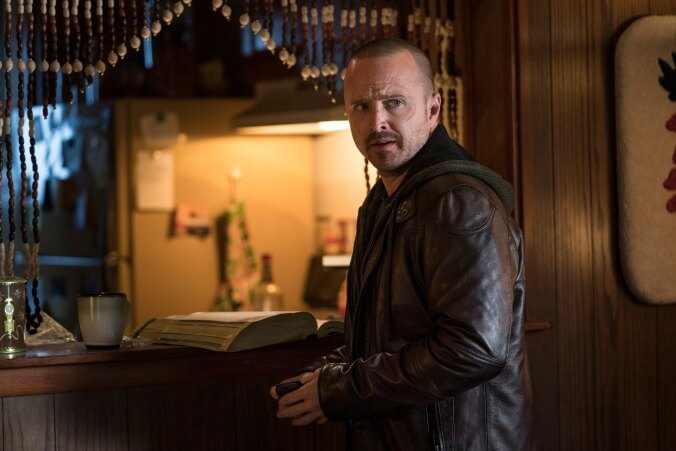Every story Vince Gilligan has set in Albuquerque is a tragedy—until now.
Jesse’s story, Gilligan has decided, is different.
The road Jesse travels doesn’t have to be the same as Walter’s and Saul’s, if only because he is at a different stage of life. He may not be able to “set things right,” as Mike warns him against trying to do, but he’s still a young man of 26. The secret to his future lies in being able to imagine that he might not be the hero, coping with and conquering whatever the universe throws at him. He doesn’t have to be the outlaw, finding the cracks in normal society for illicit schemes and Peter Pan values. He doesn’t have to be the heartless, casually cruel foot soldier who treats other people as means to his ends. He could be… someone unremarkable. Someone who drives a Pontiac Fiero.
When Walter found him, Jesse was a dead-end kid. Walter’s worst crime was manipulating Jesse’s ambition, and then his loyalty, down through bottomless levels of self-destruction and fatalism. In a flashback to the aftermath of season two’s marathon “4 Days Out” cook, Walter paternalistically urges Jesse to go to college, and asks him what he’d study. “Sports medicine?” Jesse throws out, but Walter has something else in mind—business, maybe management. Walter’s vision narrows to the width of a sniper’s scope because he assumes the boss’ job is the only job worth having. But Jesse offhandedly conjures a life spent on the sidelines, taking care of the real stars. He has a different horizon because he never wanted the spotlight.
Rescued and rising from the grave—literally—Jesse, alone among the Breaking Bad cast of characters, has a chance for a future. But this small measure of grace takes some hard winning. The story of Jesse Pinkman is still battered, scarred, bloody, and haunted. We drive, run, hide, trudge, and backtrack with him, crossing and recrossing the unrelenting Albuquerque grid, every inch of progress twisting into yards of complications. And as Jesse grinds out the hard road he’s chosen, Aaron Paul emerges as an even more magnificent performer than his multiple Emmys attest. Gilligan’s camera won’t let us look away from him: painfully infantilized by Todd in flashback, flinching and broken at Badger’s house, desperate in Todd’s apartment, regressing to petty defiance at the vacuum shop, and wearily dominant at Kandy Welding.
Did Jesse’s story need to be told? Four years ago, I didn’t think so. Emotionally invested as I was in his escape in the finale, I didn’t want my vague hopes in that direction diminished, rendered mundane by an actual depiction. But what I’ve always loved about letting Vince Gilligan tell me stories is that it’s not about what I want. I look forward to hearing him all the way through, seeing what he wants to show me, thinking about it afterwards rather than trying to engineer or predict it in advance. I should have known that when he decided to tell Jesse’s story, it would be necessary. To give Jesse his escape, Gilligan has to take him through the fires of purgatory. Months of torture and captivity have marked him; who could truly believe that simply fleeing was enough? He struggles upward and outward, sliding back, negotiating with those who hold the keys or stand in his way. Over the course of El Camino’s two hours, we see what’s changed in him through each scene of dogged determination. And when he makes it, we don’t have to just hope for the best for him anymore. We can believe.
No one gets off easy in Gilligan’s New Mexico desert. At least one person, though, gets out alive.

 Keep scrolling for more great stories.
Keep scrolling for more great stories.
